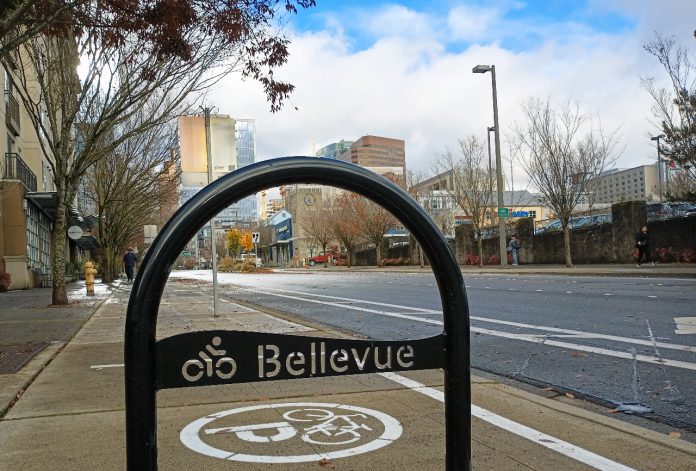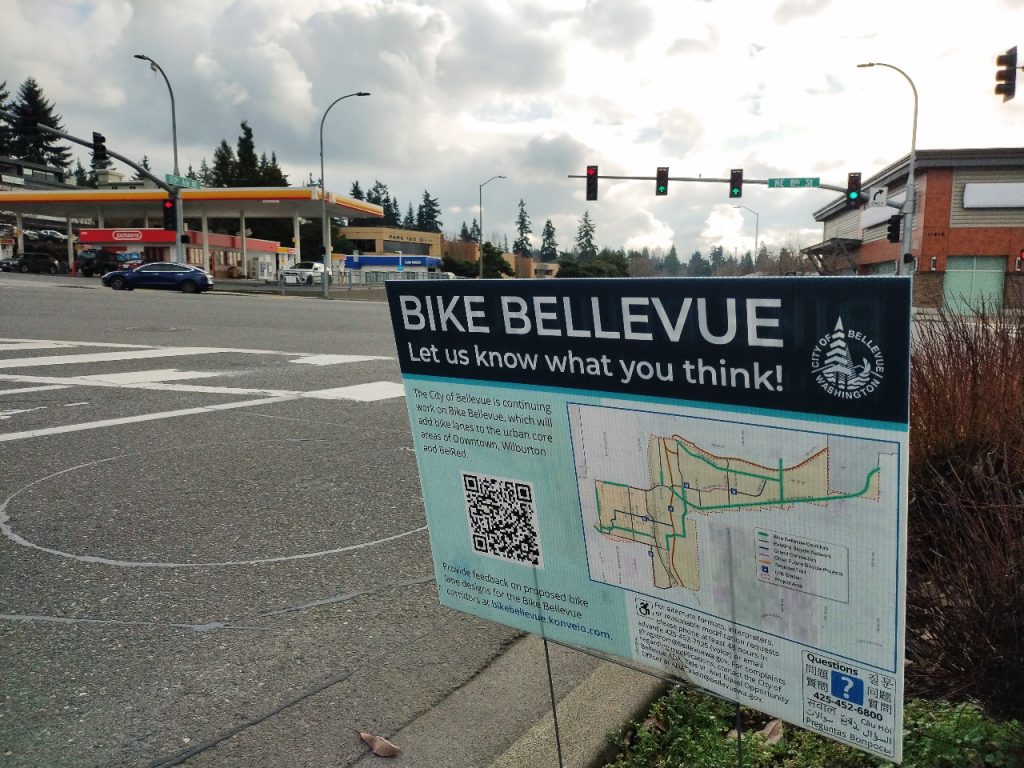
A longtime City of Bellevue transportation planner ensnared in a ethics complaint over his work on a high-profile mobility and safety project has been fully cleared of wrongdoing by the City, according to a full report obtained by The Urbanist via a records request. The ethics complaint, filed in December, alleged that Franz Loewenherz, Bellevue’s Mobility Planning and Solutions Manager, violated city policy by engaging in communication with specific individuals about Bike Bellevue, the city’s latest bike network expansion plan. It alleged that he “engag[ed] in a biased, covert and selective effort to undermine the Bike Bellevue public engagement process” when it came to five emails he sent last fall.
“[W]e conclude that the actions of Mr. Loewenherz alleged in the Complaint to be a violation of RCW 42.23.070 and the City’s employee ethics code, were not,” the report states after running through the allegations and the process the city undertook to investigate them. Eight current City of Bellevue employees were interviewed as part of the investigation, with the final report delivered on January 12.
The complaint was filed by Phyllis White, a resident of Bellevue’s Wilburton neighborhood who has opposed the Bike Bellevue plan.
“The potential impact of eliminating existing car lanes, a significant part of the plan, has not been clearly communicated, creating an unfair advantage in steering the plan’s direction,” White wrote to Bellevue officials in December. That month, the Bellevue Transportation Commission held a public hearing on the plan, with a broad swath of people coming out to support the project and a significant number of people who opposed it, due to planned reallocation of vehicle space.

Last week, The Urbanist reported the news that Bike Bellevue, a planned network upgrade that would create safer walking and biking conditions on 11 corridors in the BelRed, Wilburton, and Downtown Bellevue neighborhoods, had been “paused” while the investigation into Loewenherz’s behavior wrapped up, with the City set to seek additional direction from the Bellevue City Council on how to proceed in late March. In the meantime, Loewenherz had been assigned away from Bike Bellevue and the project’s overall future remains unclear.
The report, produced by Bellevue’s City Attorney and Deputy City Attorney, detailed three allegations, none of which were found to be violations of the city’s ethics code or state law. One is that Loewenherz “share[d] information about Bike Bellevue with community-based organizations,” including Seattle Bike Blog, Cascade Bicycle Club, Eastrail Partners, and Complete Streets Bellevue. It’s almost hard to believe that allegation actually constitutes an ethics complaint, but the complaint alleges the intent was to “invite significant responses from non-Bellevue residents.”
“The evidence does not support the conclusion that emailing the [community-based organizations] to share publicly available information and encourage use of the Konveio [outreach] tool, which was also shared with other local organizations at the same time, including the Chamber and the [Bellevue Downtown Association], was an atempt [sic] to ‘skew the results,'” the report notes. “Rather, it was consistent with the goal of encouraging greater community engagement.”
The second allegation was that Loewenherz emailed Lara Gardner, of the group Eastside Urbanism, about Bike Bellevue’s public engagement process, after Gardner suggested some potential ways to increase public interest. In his response, Loewenherz stated that the City “need[s] to be careful in our communications,” something wholly proven by the filing of this overall ethics complaint. “In the context of the entire email chain, it does not appear that Mr. Loewenherz was requesting Eastside Urbanism communicate a specific message about Bike Bellevue or serve as a ‘communications proxy’ as alleged in the Complaint,” the report concludes.

The third allegation was that Loewenherz shared emails from Mariya Frost, head of transportation for Kemper Development, one of the most powerful real estate interests in Bellevue and the operator of Bellevue Square Mall, with Gardner and Christopher Randels of Complete Streets Bellevue. (Randels is also a contributor to The Urbanist.) Loewenherz wrote the pair that he was sharing the emails, which included talking points Frost was using to push back on Bike Bellevue, “in confidence” after they had requested information on what the City was “hearing in the way of opposition.”
“Mr. Loewenherz’ explanation that he forwarded Ms. Frost’s communications because they were requested by Mr. Randels and Ms. Gardner is credible,” the report states. “[T]he documents were public records that the City would be required to provide upon request and would eventually be published to the City’s website. Further, Mr. Loewenherz similarly provided records to other requesters who have expressed concerns about the Bike Bellevue project.”
In retrospect, the ethics complaint seems to have been a clear attempt to throw a wrench into the spokes of Bike Bellevue, with very little merit to the actual complaint. But with the complaint now dealt with, Bike Bellevue should be able to get back on track.
Ryan Packer has been writing for The Urbanist since 2015, and currently reports full-time as Contributing Editor. Their beats are transportation, land use, public space, traffic safety, and obscure community meetings. Packer has also reported for other regional outlets including Capitol Hill Seattle, BikePortland, Seattle Met, and PubliCola. They live in the Capitol Hill neighborhood of Seattle.


